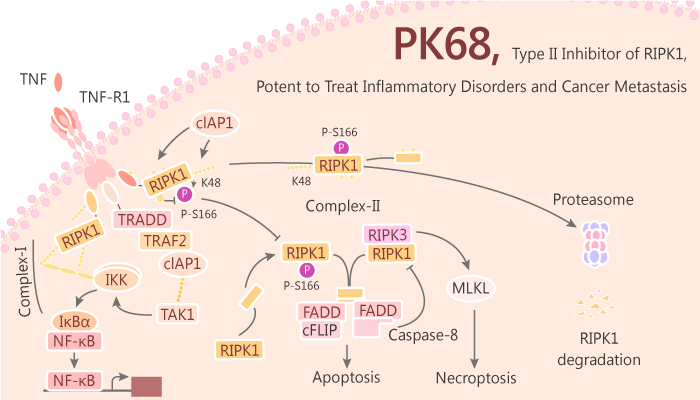Necroptosis is a form of regulated necrosis controlled by receptor-interacting kinase 1 (RIPK1), RIPK3, and mixed lineage kinase domain-like protein (MLKL). Necroptosis closely associates with pathologies including inflammatory diseases, neurodegenerative diseases, and cancer metastasis. Herein, researchers discovered the small-molecule PK6 and its derivatives as a novel class of necroptosis inhibitors that directly block the kinase activity of RIPK1. Fortunately, optimization of PK6 leads to PK68, a highly selective inhibitor of RIPK1 kinase activity with an IC50 of around 90 nM. Moreover, PK68 blocks the kinase activities of both human RIPK1 and mouse RIPK1 in vitro.

PK68 is a highly potent inhibitor of TNF-induced necroptosis. Especially, PK68 displays potent cellular efficacy and suppresses necroptosis in human, mouse, and rat cells. In addition, PK68 displays favorable kinome selectivity and pharmacokinetic properties. PK68 efficiently blocks cellular activation of RIPK1, RIPK3, and MLKL upon necroptosis stimuli. In addition, PK68 displays reasonable selectivity for inhibition of RIPK1 kinase activity and favorable pharmacokinetic properties. Importantly, PK68 provides strong protection against TNF-α-induced systemic inflammatory response syndrome in vivo. PK68 exhibits a favorable pharmacokinetic profile and no obvious toxicity in mice. Notably, pre-treatment of PK68 powerfully blocks TNF-induced lethal shock and inflammatory responses as well as tumor metastasis in vivo. Moreover, PK68 significantly represses metastasis of both melanoma cells and lung carcinoma cells in mice.
Together, this study demonstrates that PK68 is a potent and selective inhibitor of RIPK1 and also highlights its great potential for use in the treatment of inflammatory disorders and cancer metastasis.
Reference: